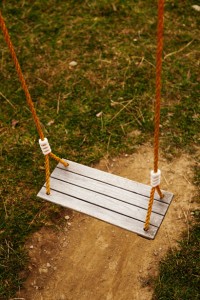Where are all the kids?
One of Plum’s friends charmingly offered up some insight into the modern problem of finding kids outside: “I don’t have ADD (Attention Deficit Disorder,) I have ODD (Outside Deficit Disorder.)” Translation: she has little tolerance for the outdoors. Couple this particular friend’s stance with the popular adult theory that our kids are at risk from various predators, and no one under 16 is to be found outside their home.
Our city has numerous playgrounds nestled within many neighborhoods. But these parks are never teeming with kids. Our local playground has at least 15 children living on streets directly connected to the park (10s of more within walking distance), but you’d be hard pressed to find more than 5 of these kids at the playground on the best day. On our daily walks, we hardly ever bump into a child biking alone around the neighborhood or just enjoying a walk on their familiar streets.
When we TR parents were young, we recall a huge amount of independence in our day-to-day. Our parents practically shoved us out the door on the weekends. We walked/biked to through depressed neighborhoods and sketchy parks. We roamed in packs with our friends that we randomly ran into while exploring around our town. There were kids we knew, and kids we had never met, to be found everywhere.
Now, our Bluey is usually disappointed to find that he is the only one at the park. And our Plum goes out on bike rides hoping to run into a friend only to return home reporting that no one was found. When Plum has a friend over, they usually stick to her room or to the family room. Plum’s suggestions to go outside aren’t usually entertained for long, if considered at all.
We demand outside time for our kids. And we encourage them to explore independently within family guidelines that are appropriate for their ages. We’d love to know that when they are out and about, spontaneous socialization is possible. Unfortunately, it seems that only rarely happens.